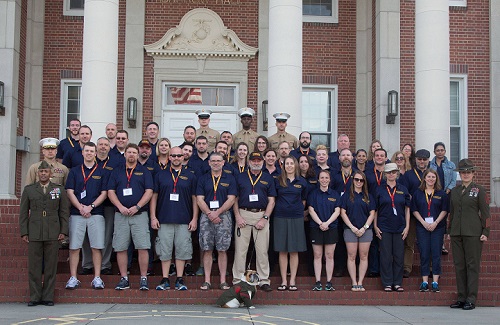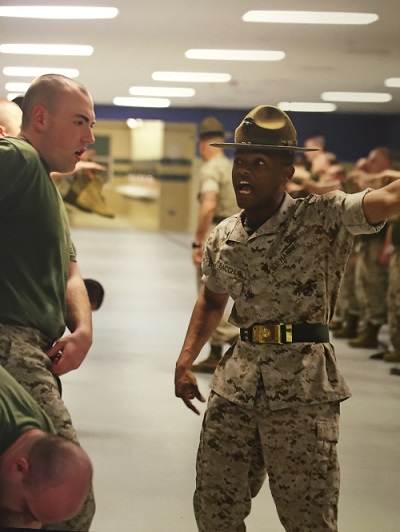'On Posthuman War' Traces Expansion of Military Violence Into Ordinary Life

By Bethany Bump
ALBANY, N.Y. (Nov. 8, 2022) — As an academic, Mike Hill appreciates theory. But the University at Albany English professor also understands theory can only go so far.
Experience, he believes, adds richness and understanding in a way that theory alone cannot. Which is why, for a book about the coming white minority published in the early 2000s, he embedded with neofascists in Virginia. And it’s why, for his latest book on war and the expansion of military violence into ordinary life, he opted to experience firsthand the physically and psychologically grueling boot camp offered by the U.S. Marine Corps at Parris Island, South Carolina.
Experiencing this training — “the high-wire obstacle course, the ungodly predawn hours with too little sleep, the sand pit…the relentless drilling…the rifle range…the one-hundred-foot rappel tower,” as his book notes — lent important insight into the theories behind his interest in the growing militarization of human experience.
“It really, really changed the way I thought about things and I did it all the way,” Hill said. “As often as I get read as a hopelessly abstract, political, cultural theory person, I do think that the experiential part is key.”

Hill’s new book, On Posthuman War: Computation and Military Violence, traces the unseen expansion of military violence in recent decades from traditional battlefronts to the concept of the human being itself. Published by the University of Minnesota Press in August, the book draws on counterinsurgency field manuals, tactical manifestos, data-driven military theory and war archives to explore how human-focused concepts such as identity, culture and cognition have been weaponized in the wake of the Sept. 11, 2001, terrorist attacks. Hill shows in his book how contemporary war is being waged in new and alarmingly expansive ways.
The U.S. National Security Strategy, composed in the wake of 9/11, demonstrates this shift, Hill writes. Contemporary military doctrine is less interested in traditional warfare involving overt military confrontation between states than it is on irregular warfare, which seeks to influence populations at large, permanently and preemptively eroding the friend/foe distinction by using strategic communications, cyber operations, psychology and other means.
The NSS, Hill writes, describes enemies as “shadowy networks… that reach into every corner of the globe” and foreshadows a state of “Forever War,” in which there is no obvious opposing force, clear beginning or peaceful end to military violence.
“We are fighting on many fronts… against a particularly elusive enemy. Future wars will be seen… and unseen… and will continue over an extended period of time,” the NSS reads.
To fight these wars, the global military apparatus is using computational technologies to amass and track data across communication channels, Hill writes. Today’s battlefields, he argues, are more akin to “data-fields” in which “personal, cultural and cognitive interactions” are counted, categorized and reassembled into war material.
Devoting a chapter each to the human-focused disciplines of demography, anthropology and neuroscience, Hill explains how these fields are being used by military powers to reorient humans from neutral citizens into unwitting combatants.
U.S. demography entered uncharted territory after 2000, for example, when changes to the census were adopted allowing individuals to select one or more races for the first time since 1790. While the change was propelled by activists seeking multiracial recognition and protections, the sheer volume of categorical combinations this created fed vast new realms of data to war strategists who saw identity as something that could be manipulated for political ends.
How individuals identify themselves and their affiliations to various groups is of increasing interest to war planners, who have long relied on anthropology — or the study of human culture and relationships — to aid war efforts.

Efforts are underway, Hill writes, to reinvent and expand the Human Terrain System, a program used by the U.S. Army in Iraq and Afghanistan that attempted to map the culture of local populations, including self- and group identification, for real-time use by battle commanders.
Meanwhile, advances in neuroscience have presented the military with yet another battlefront: human cognition. New brain-machine interface technologies described as “telepathic helmets” pose the possibility of compressing the “kill chain” beyond traditional ways of firing at a target by seeing, categorizing and then activating a weapon for its destruction.
“The plane, missile, rifle, or small arms device is an extension of the cognitive state,” Hill writes.
While the themes he explores are dark, Hill says he hopes his book provides an awareness that can help empower people to become more politically involved and proactive about creating alternative ways of living with and amongst each other.
“We’re involved in these things whether we like it or not,” he said. “There is no neutral position. And so, [the book] is sort of an invitation to know more about what your relationship is to the state and to the world and to military power, and to politics and force. And to have to kind of think about these issues in how we live our lives. I was hoping to get readers talking about our own responsibilities and to understand what’s become of traditional notions of citizenship a little bit.”




